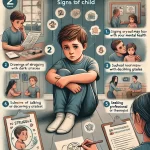When Parents Go to War: The Damage of Custody Battles and Spiteful Divorce Tactics
Divorce and custody disputes are often emotionally charged, but when parents use their children as weapons against each other, the ones who suffer the most are the children themselves.
In South Africa, many parents embroiled in bitter breakups lose sight of what truly matters—the well-being of their child. Instead of making decisions in the best interests of the child, they become focused on winning, punishing, or outdoing the other parent.
If you’re going through a divorce or custody dispute, this post is a reality check on how toxic behavior affects your child and why it’s crucial to separate your emotions from your parenting. Your fight is with your ex, not your child.
🚨 The Toxic Behaviors That Harm Children During Divorce
❌ Using the Child as a Messenger or Spy
- Asking your child to report on the other parent’s personal life.
- Sending passive-aggressive messages through the child instead of communicating directly.
❌ Refusing Consent for Therapy or Medical Care to Spite the Other Parent
- Denying the child mental health support because the other parent suggested it.
- Using medical decisions as a battleground instead of focusing on the child’s well-being.
❌ Parental Alienation: Turning the Child Against the Other Parent
- Speaking negatively about the other parent in front of the child.
- Encouraging the child to reject, fear, or resent the other parent.
- Making a child feel like they have to “choose sides.”
❌ One-Upping and Trying to Be the ‘Favorite’ Parent
- Overcompensating with gifts, trips, or no rules to seem like the “fun” parent.
- Undermining the other parent’s discipline to create division.
- Making the child feel guilty for enjoying time with the other parent.
❌ Dragging the Child into Adult Issues
- Discussing financial or legal battles in front of them.
- Making them feel responsible for your emotional pain.
- Using guilt or emotional manipulation to make them “side” with you.
💡 The Psychological Impact on Children
When parents weaponize their children in a divorce, the long-term effects can be devastating.
🚨 Emotional Stress & Anxiety – Children feel trapped, confused, and pressured to choose sides.
🚨 Loyalty Conflicts – Feeling guilty for loving both parents and afraid of betrayal.
🚨 Low Self-Esteem – Internalizing blame for the conflict.
🚨 Difficulty in Future Relationships – Learning unhealthy relationship patterns from their parents.
🚨 Increased Risk of Mental Health Issues – Depression, anxiety, and behavioral problems.
🚨 Trust Issues & Fear of Abandonment – Struggling with trust in relationships later in life.
Your child did not ask for this battle—stop making them a casualty of your war.
👀 What Parents Need to Remember
✔ Your child is not a pawn – Divorce is between the parents, not the child.
✔ Therapy is for the child, not the other parent – If your child needs help, blocking therapy to punish your ex only harms your child.
✔ Children need stability, not war – Co-parenting with maturity is the best gift you can give your child.
✔ A toxic breakup does not justify toxic parenting – The pain of divorce should not be passed onto the child.
✔ No amount of winning in court will fix the damage of bad parenting – Prioritize your child’s emotional well-being over proving a point.
🚀 How to Prioritize Your Child’s Well-Being During Divorce
🔹 Keep Communication Child-Centered – Discuss co-parenting arrangements privately, not through your child.
🔹 Support Therapy & Mental Health Needs – If your child is struggling, let them receive professional support.
🔹 Respect the Other Parent’s Role – Even if you don’t like them, your child deserves a healthy relationship with both parents.
🔹 Seek Mediation Instead of Court Battles – If possible, resolve disputes through communication rather than conflict.
🔹 Remember: Your child is not a possession – They are a human being who needs love, support, and security from both parents.
💡 Final Thought: Love Your Child More Than You Hate Your Ex
✔ Divorce is painful, but it should not destroy your child’s sense of safety, love, and stability.
✔ Your child is not a tool for revenge—protect their well-being above all else.
✔ If co-parenting is difficult, seek guidance from a psychologist or mediator to navigate the process with maturity.
💙 If your child is struggling with the emotional toll of divorce, therapy can provide them with a safe space to process their feelings.




